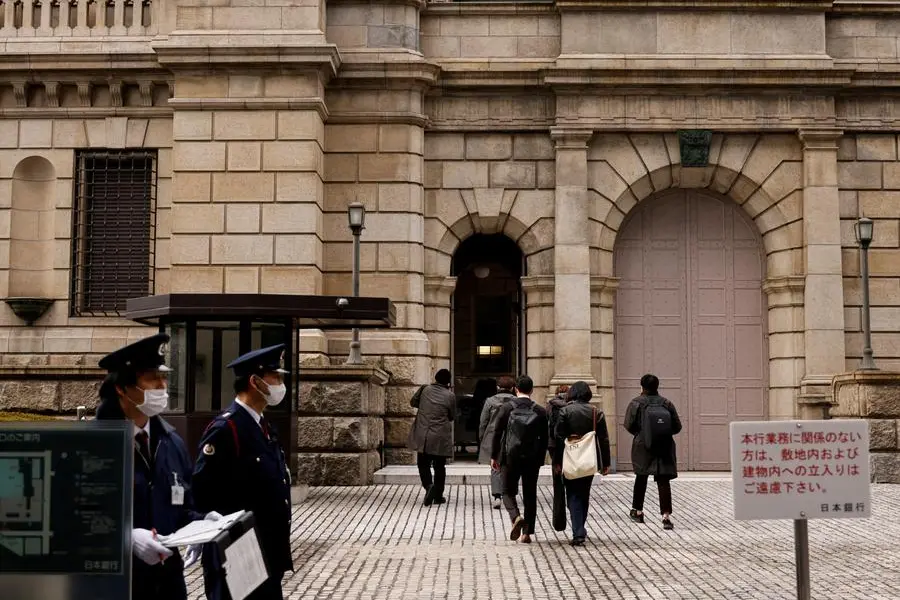PHOTO
SINGAPORE/TOKYO - Japan's government bond market has turned into a cat-and-mouse arena for investors and the Bank of Japan, as the latter tries to slow a rise in yields towards its new policy ceiling and hungry investors go a step ahead and snap up the bonds.
The game began after the Bank of Japan (BOJ) tweaked its complex seven-year old yield-curve-control (YCC) policy on Friday, saying yields on the 10-year Japanese government bond (JGB) it targets can move flexibly and as far as 1%, rather than be capped at 0.5%.
Over the two trading days since, the market has tried to second-guess the pace at which the BOJ wants yields to move, while the BOJ has run special bond-buying operations to cap yields.
Analysts say the BOJ's small shift in policy has opened investor floodgates to the world's third-biggest bond market, and their pent-up demand could ironically ensure the ceiling on yields is not tested for a long time.
"It's basically happy news for us. And now we've started buying little by little," said a Japanese private pension fund manager, who requested anonymity as he is not authorized to speak to media.
"There is only a very, very small possibility of a sudden or very steep rise in JGB yields, because too many people want to buy the bonds. There are many potential buyers and very few potential sellers in the market."
Tuesday's auction of the benchmark 10-year bonds was proof of such demand. The maximum yield investors demanded was 0.6%, just 10 basis points (bps) above the previous policy cap.
The foreign bid for JGBs has been strong this year as rising rates in the United States and Europe meant dollar and euro investors get paid a lot for hedging their yen holdings.
Local banks, pension funds and insurance companies are now joining that bid for JGBs, hoping the still negative overnight rates, a slightly steeper yield curve and reduced BOJ presence in the bond market will allow for more returns and liquidity.
"The initial target for investors seems at least 0.70% to 0.80% so we continue to expect a grind higher in yields and are positioned for such," said Ales Koutny, head of international rates at Vanguard Asset Management.
"That's the kind of level we heard over and over again from local investors. It also starts looking interesting on a risk reward for currency-hedged investors."
JGB HOLDINGS
Latest surveys show most Japanese insurance firms (lifers) brought money back home into yen this year, but kept it idle rather than put it in loss-making JGB investments.
"Domestic investors view this from an opportunity cost angle," said Rong Ren Goh, fixed income investments director at Eastspring Investments in Singapore.
"The cost of hedging from US dollars to yen increases with the Fed hiking continuously while BOJ continues to stay put. It makes sense to thus rotate back to JGBs which now give a better yield than FX-hedged U.S. Treasuries."
The hedging dynamics work favourably for foreigners seeking yen assets. The promise of an extra 10-20 bps of JGB yield means 10-year JGBs hedged from dollars into yen can yield upwards of 6%.
As per BOJ data, lifers and pension funds held roughly 26% of a 1,132 trillion yen ($7.93 trillion) JGB market at the end of 2019. Foreigners held 12.9%, led by U.S. and Belgian investors.
By March 2023, the first group's share was down to 23%, foreigners held 14.5% and the BOJ held 47% of 1,229.8 trillion yen worth JGBs.
Rising yields should allow lifers to offset the high risks in their long-term liabilities, analysts said.
Through the YCC years, Japan's pension funds too have struggled to meet their guaranteed payout obligations, ranging from 1.25% to 2.5%, on corporate plans, and some such as Nippon Life slashed their promised payouts last year.
Tomoya Masanao, co-head of Japan and co-head of Asia Pacific portfolio management at PIMCO, says the BOJ's new 1% yield benchmark may never be reached.
"If yields were to rise anywhere close to 1%, there should be very strong demand for Japan duration (long-term bonds) from domestic investors, which would be enough to contain a yield rise," Masanao said.
($1 = 142.7700 yen)
(Additional reporting by Rae Wee in Singapore, Tom Westbrook in Sydney, Harry Robertson and Alun John in London; Writing by Vidya Ranganathan; Editing by Himani Sarkar)





















